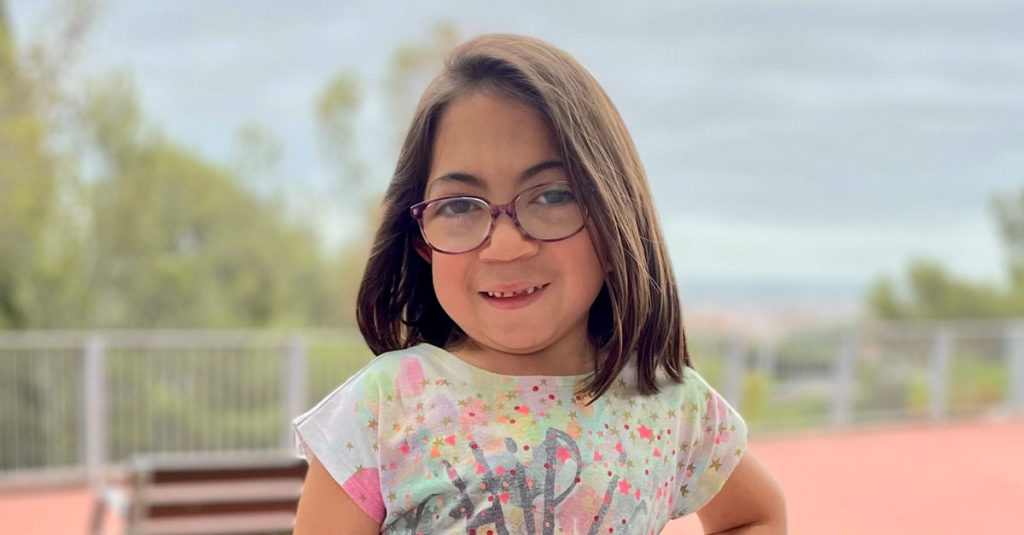The child, born with mucopolysaccharidosis type 6, was treated with gene therapy in 2020 and to date her liver is able to produce the missing enzyme that causes the disease.

"The thing that makes me the happiest is no longer having to go to hospital every week, without missing any school days. I want to thank everyone who made this possible!" Words of Alba, seven years old, the youngest person in the world to have received an experimental treatment born in the laboratories of the Telethon Institute of Pozzuoli (Tigem) and which could change the lives of those like her who were born with a rare genetic disease, mucopolysaccharidosis type 6, for the better.
The birth of Alba
His parents, Ignacio and Aida, met in 2007 in Terragona, Spain: here, the Argentine-born father moved to work as a paramedic and it was in the hospital that he met his future wife Aida, who is a nurse. Once married, Alba arrived in 2014: a much-desired daughter who, however, at the age of one year, began to trouble her parents. 'She was breathing badly and always had a lot of mucus: to our eyes as people used to working in the medical field, it sounded like an alarm,' Ignacio says.
After long wanderings, the diagnosis arrived thanks to doctors at the Barcelona Children's Hospital who, also based on Alba's physiognomy, suspected a form of mucopolysaccharidosis. At the age of two, the child was definitively diagnosed with mucopolysaccharidosis type 6, a metabolic disease of genetic origin of which her parents were, unknowingly, healthy carriers.
It is due to the deficiency of an enzyme responsible for the disposal of particular substances that, by accumulating, can damage the cells of vital organs such as the skeleton, eyes and heart. On a positive note, unlike other mucopolysaccharidosis, this form does not affect the central nervous system, so sufferers do not experience any cognitive retardation.
"Even though we were prepared for the fact that Alba had something, it was still very difficult for us to accept the diagnosis because there was no cure".
The only treatment available to partially control the symptoms of the disease - which causes thickening of the heart valves, skeletal deformities, and opacity of the cornea, among other things - is enzyme replacement therapy: that is, going to the hospital every week for several hours to have the drug infused intravenously.
Ignacio's tenacity leads to a breakthrough
Dad Ignacio, however, does not give up and starts looking for information on the Internet. He discovers that an Italian researcher, Alberto Auricchio of Tigem in Pozzuoli, is working on an innovative and potentially decisive cure for his daughter's illness, gene therapy: thanks to a virus, suitably manipulated in the laboratory, a healthy version of the gene for the missing enzyme can be transported into the patients' cells. A close correspondence began between the father and the Italian scientist: the results on animal models have been very positive and the time is almost ripe for human experimentation, but for Alba it is still early days, not least because you have to be at least four years old to take part.
In November 2017, at the Department of Paediatrics of the Policlinico 'Federico II' in Naples, the trial finally got underway, under the guidance of Nicola Brunetti-Pierri, and the first patient was treated. Two years later, in September 2019, Alba flies to Italy with her family to do all the tests to assess whether she qualifies for inclusion in the trial. After a week, the doctors give Ignacio and Aida the good news they were waiting for: the girl is eligible to receive gene therapy:
"For us it was a beautiful moment, a rebirth: we could give our little girl a new life.
Meanwhile, the family expands with the arrival of a little sister, Jana, who is perfectly healthy.
In May 2020, just after the end of the lockdown imposed in Italy by the Covid-19 pandemic, the family arrived in Naples: during the summer of the year that shocked the entire planet, Alba received the gene therapy, the youngest ever in this unique study.
The dawn of a new life
Today, two years on, Alba is still 'free' from the infusions: her liver, thanks to gene therapy, is able to produce enough enzyme to detoxify the body of the substances that previously accumulated. As described by the Tigem researchers in the pages of the New England Journal of Medicine-Evidence, the experimental treatment has proven to be safe and, at the highest doses, able to supplant the enzyme replacement therapy.
"Our daughter is not only better, but no longer has to 'sacrifice' one day a week to replacement therapy. She no longer misses school days and can devote herself to everything she likes to do: cycling, synchronised swimming, playing the saxophone. She has many friends with whom she grew up: she has a very strong bond with them and has suffered a lot from the distance from them and her relatives during these two years, first because of the pandemic and then because of the gene therapy. All the medical staff have been exceptional, we have had a great time and we are really grateful to the Telethon Foundation and Tigem researchers for giving our daughter this chance. I hope our story will help people understand why scientific research is so important and deserves to be supported and encouraged, for the patients of today and tomorrow'.